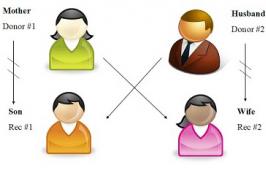Matching
How to match individuals to other individuals or goods is an important problem in society: e.g. student placement in schools; labor markets where workers and firms are matched; organ donation where patients are matched to potential donors. Matching theory and market design analyze these problems and propose solutions to improve real-life institutions. In recent years, advances in matching theory and market design have helped New York City and Boston to design their school choice programs, medical communities to reorganize their hiring procedure, and to organize systematic kidney exchange mechanisms to give kidneys to as many patients as possible.
Related posts
|
From theory to application In a large number of real-life markets agents exchange goods or services | READ MORE ... |
Article We study the school choice problem in which a school district assigns school | READ MORE ... |
Working paper Since stable matchings may not exist, we adopt a weaker notion of stability for | READ MORE ... |
|
Article This paper investigates whether interracial contact in childhood impacts adult | READ MORE ... |
Working paper This paper reports on laboratory experiments on the formation of partnerships | READ MORE ... |
Article Recent investigation of sovereign debt negotiations finds that serious debt | READ MORE ... |
|
Article This paper deals with roommate problems (Gale and Shapley, Am Math Mon 69(1):9– | READ MORE ... |
Article In the context of school choice, we experimentally study how behavior and | READ MORE ... |
Article The selection of blocking pairs to be matched plays an important role in the | READ MORE ... |
|
Working paper The multiple partners game (Sotomayor, 1992) extends the assignment game to a | READ MORE ... |
Working paper The possibility of designing efficient, ex-post incentive compatible, single | READ MORE ... |
Article In this paper, we investigate gender differences in workers' career | READ MORE ... |
|
Article We develop a general theoretical framework that allows us to study the group | READ MORE ... |
Article We use a two-sided matching framework to analyze collaboration between | READ MORE ... |
Working paper In many societies, marriage is a decision taken at the familial level. Arranged | READ MORE ... |
|
Working paper This paper analyzes farsighted stable sets when agents have heterogeneous | READ MORE ... |
Working paper We study stable sets for marriage problems under the assumption that players | READ MORE ... |
Article We analyze the two-stage games induced by competitive equilibrium rules for the | READ MORE ... |
|
Working paper We study the problem of allocating projects to heterogenous workers. The | READ MORE ... |
Working paper We consider school choice problems (Abdulkadiroğlu and Sönmez, 2003) where | READ MORE ... |
Article We analyze the manipulability of competitive equilibrium allocation rules for | READ MORE ... |
|
Article We use a two-sided matching framework to analyze collaboration between | READ MORE ... |
Working paper We consider the problem of assigning agents to slots on a line, where only one | READ MORE ... |
Working paper We introduce a new criterion to compare the properties of mechanisms
when the | READ MORE ... |
|
From theory to application . |
Working paper We study the structure of the set of (Nash) equilibria of a deferred acceptance | READ MORE ... |
Working paper We study many-to-many matching markets in which agents from a set A are matched | READ MORE ... |
|
Working paper We study von Neumann Morgenstern stable sets for one-to-one matching problems | READ MORE ... |
Article Many instances of social interaction display either or both of the following | READ MORE ... |
Article Many salient rules to allocate private goods are not only strategy-proof, but | READ MORE ... |
|
Article This paper studies how search externalities and wage bargaining distort vacancy | READ MORE ... |
Working paper We analyze the optimal contract in static moral hazard situations, where the | READ MORE ... |
Working paper This paper introduces a novel set of one-to-one matching problems: matchings | READ MORE ... |
|
Working paper The objective of the paper is to analyze the formation of social networks where | READ MORE ... |
Article We provide a new, welfarist, interpretation of the well-known Serial rule in | READ MORE ... |
Working paper The paper considers a one-to-one matching with contracts model in the presence | READ MORE ... |
|
From theory to application One of the most common online activities is search. Large companies, such as | READ MORE ... |
Article When not all objects are acceptable to all agents, maximizing the number of | READ MORE ... |
Book "A beautiful dozen. Twelve papers presented in 20 years of meetings of the | READ MORE ... |
|
Article Solution concepts in social environments use either a direct or indirect | READ MORE ... |
Article We study two cooperative solutions of a market with indivisible goods modeled | READ MORE ... |
Article We study the length of agreements in a market in which infinitely-lived firms | READ MORE ... |
|
Working paper The paper evaluates the effect of residency matching and prospective payment on | READ MORE ... |
Working paper Searching for partners involves informational persistence that reduces future | READ MORE ... |
Working paper We observe that three salient solutions to matching, division and house | READ MORE ... |
|
Working paper Pairing Games or Markets studied here are the non-two-sided NTU generalization | READ MORE ... |
Working paper We analyze the Condorcet paradox within a strategic bargaining model with | READ MORE ... |
Article We study the problem of assigning objects to a set of agents. We focus on | READ MORE ... |
|
Article Solution concepts in social environments use either a direct or indirect | READ MORE ... |
From theory to application Market design is a rapidly growing field of economics. In a somewhat stylized | READ MORE ... |
From theory to application There are two treatments for patients with renal disease: dialysis and | READ MORE ... |
|
Article This paper studies the implementation of quotas in matching markets. In a | READ MORE ... |
Article We consider one-to-one matching markets in which agents can either be matched | READ MORE ... |
Working paper In this paper, we suggest a simple sequential mechanism whose subgame perfect | READ MORE ... |
|
Working paper |
Working paper Solution concepts in social environments use either a direct or indirect | READ MORE ... |
Working paper We develop a two-sided matching model to analyze collaboration between | READ MORE ... |
|
Working paper This paper studies many-to-one matching markets where each student is assigned | READ MORE ... |
Working paper We consider the problem of assigning agents to slots on a line, where only one | READ MORE ... |
Working paper Decentralized matching markets on the internet allow large numbers of agents to | READ MORE ... |
|
Working paper Since no stable matching mechanism can induce truth-telling as a dominant | READ MORE ... |
Working paper We prove a “General Manipulability Theorem” for general one-to-one two-sided | READ MORE ... |
Working paper We consider one-to-one matching problems under two modalities of uncertainty | READ MORE ... |
|
Working paper We consider two-sided many-to-many matching markets in which each worker may | READ MORE ... |
Working paper We propose a search-matching model of the marriage market that extends Shimer | READ MORE ... |
Working paper Much of the job search literature assumes bilateral meetings between workers | READ MORE ... |
|
Working paper In the context of resource allocation on the basis of priorities, Ergin (2002) | READ MORE ... |
Working paper We show that the full version of the so-called ‘rural hospital theorem’ | READ MORE ... |
Working paper |
|
Working paper The mechanism used in Nash implementation is a form of direct democracy, taking | READ MORE ... |
Working paper In matching markets the number of blocking pairs is often used as a criterion | READ MORE ... |
Working paper We use laboratory experiments to analyze decentralized decision-making in one- | READ MORE ... |
|
Working paper The lack of stability in some matching problems suggests that alternative | READ MORE ... |
Working paper Some labor markets have recently developed formal signalling mechanisms, e.g. | READ MORE ... |
Working paper In this note, we start to claim that established marriages can be heavily | READ MORE ... |
|
Working paper We propose a model of Kidney-Exchange that incorporates the main European | READ MORE ... |
Working paper he aim of this paper is to provide a detailed analysis of the process of | READ MORE ... |
Working paper A coalitional matching is a two-sided matching problem in which agents on each | READ MORE ... |
|
Working paper We consider one-to-one matching markets in which agents can either be matched | READ MORE ... |
Working paper We present some application of the generalized Ky Fan’s Matching Theorem stated | READ MORE ... |
Working paper This paper studies many-to-one matching market in which each agent's | READ MORE ... |
|
Working paper We analyse a model of two-sided matching and incentive contracts where expert | READ MORE ... |
Working paper We propose a new concept, the pairwise farsightedly stable set, in order to | READ MORE ... |
Working paper The core of an assignment market is the translation, by the vector of minimum | READ MORE ... |
|
Working paper We correct an omission in the definition of our domain of weakly responsive | READ MORE ... |
Working paper We study a simple model of assigning indivisible objects (e.g., houses, jobs, | READ MORE ... |
Working paper In this paper we answer a question posed by Sertel and Ozkal-Sanver (2002) on | READ MORE ... |
|
Working paper We consider general two-sided matching markets, so-called matching with | READ MORE ... |
Working paper Couples looking for jobs in the same labor market may cause instabilities. We | READ MORE ... |
Working paper An often made distinction in the study of time in organizations is that between | READ MORE ... |
|
Working paper This paper considers a decentralized process in many-to-many matching problems | READ MORE ... |
Working paper We study many-to-one matchings, such as the assignment of students to colleges | READ MORE ... |
Working paper We give a simple and concise proof that so-called generalized median stable | READ MORE ... |
|
Working paper Ma (1996) studied the random order mechanism, a matching mechanism suggested by | READ MORE ... |
Working paper I count the number of combinatorial choice rules that satisfy certain | READ MORE ... |
Working paper We study two-sided matching markets with couples and show that for a natural | READ MORE ... |
|
Working paper We show that, given two matchings of which say the second is stable, if (a) no | READ MORE ... |
Working paper We show that, given two matchings for a room-mates problem of which say the | READ MORE ... |
Working paper It is known that in two-sided many-to-many matching problems, pairwise-stable | READ MORE ... |
|
Working paper This paper studies a decentralised job market model where firms (academic | READ MORE ... |





